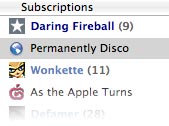Fri, October 15, 2004
Steven Levy: Cretin
I like Steven Levy of "Newsweek". He was the one who agreed with me that AOL, Rhapsody, and others who first joined the "MP3 leasing" movement to combat illegal file-sharing were totally off base. He said, as I did, that people weren't going to want to rent MP3s the way they rent DVDs from Netflix. And I believe we've been validated by the success of the iTunes Music Store over rivals like Napster that offer a subscription-style service. However, sometimes he can be such an idiot. I understand it's difficult to be a tech writer, but if you can't describe something correctly to the layperson, maybe you just have to give up. I swear to God, someone sent him a Wired News article on RSS and he went bonkers.
Just about any reader of this column is going to come away from it thinking, "I gotta get me an RSS for my Inter-web!" It's techno-tripe along the same lines that we in the web industry have been hearing for years, about how XML is going to revolutionize the world and soon everything on every computer in the universe is going to be intelligently linked to everything else. Wake me when my fridge can email the grocery store that I'm low on milk, because the XML revolution bores me.
XML is a standardized markup language, a way of tagging data that allows software (computer programs) to read that data and understand it in the same way that the HTML markup of this page can be read by your web browser and displayed as images and text in a layout, with colors, and bold, and fancy stuff like that. The software that reads HTML displays web pages, where the software that reads XML just scans for the tagged data and then does whatever with it. ("Whatever" could be displaying it, storing it, graphing it, crunching it. It depends on the software.) The point is, an XML document is just a bunch of text. It doesn't really do anything: it's a way for software to communicate with other software. It doesn't even have to be web-based, although most of its strength comes from sharing, and sharing over a network is more powerful than sharing on a disk.
RSS is a relatively recent although not super-new "flavor" of XML. Its standard is a subset of XML in general: it's also a text file with some descriptive tags around some textual data, but the options for what kind of information can be included are more restricted. Based on this simplicity, it's useful for shuttling small amounts of largely textual information back and forth. Sites (like onebee) use it to publish a list of links to recently updated items, sometimes with blurbs, so that people can read this "RSS feed" with a piece of software like NetNewsWire, or a website like kinja or Bloglines, and get a glimpse of new content. The idea is that if you subscribe to multiple RSS feeds, you can check the status of multiple websites in one place, and since this list automatically refreshes itself throughout the day, you can know what's new on your favorite sites without having to go and check. Then you follow the links, and enjoy the sites.
As Levy mentions, websites are increasingly using RSS to distribute (or "syndicate") other types of information. Product inventory, meeting schedules, or – as in Levy's example – kiddie soccer schedules. But this is hardly revolutionary. So, it's retrieved automatically? The same information could be distributed using email alerts. It's essentially a way to check web pages without a web browser. Which is useful to some, but hardly a watershed shift for the Internet in general.
An RSS feed is a tiny little text file with some dates and some links. (For example, look at a feed from onebee – it's just a few lines of text.) Levy's phrases like "RSS can be built into your computer" make it sound like some sort of advanced technology. It doesn't track your kid on the damn soccer field, it can just tell you if the location of the game changes. Or they could call you, or email you. Worst of all, the more people tout RSS as the panacea to all the web's problems, the more they try to add new features and functionalities to it, the more its basic strength – brevity – is diluted. Before long, you'll have RSS feeds that look and act like web pages, but we already have web pages! It's like cell phones that take pictures, surf the web, and control your garage door opener. The strength of the technologies of the future is specialization, but everyone's much too excited glomming extra features onto sleek, useful products. If iPods start showing photos and video, I'll eat my hat.
Also, the very title of the piece implies that the web is the sort of thing that gets upgraded. Like someone reboots the Internet and it returns with a new version. In reality, the Internet is spread out on millions of computers all over the place. Change is slow and organic. All that's really happened is that more sites are using RSS in order to share certain information – most of them spurred on by glassy-eyed middle managers who picked up the RSS buzzword from dumb articles like Levy's.
RSS isn't that big of a deal. If you want something truly innovative and useful, check out Quicksilver.

